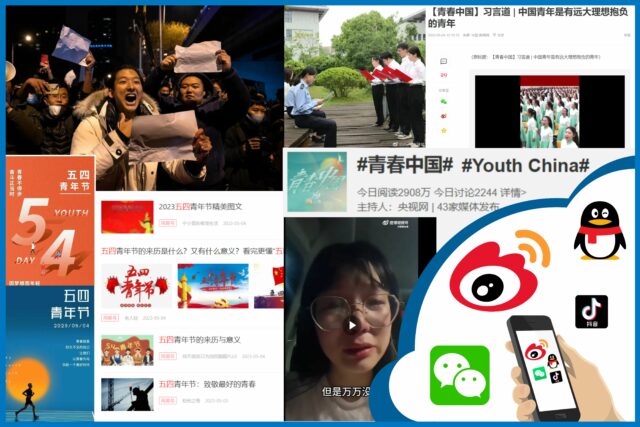“The youth is strong, so the country is strong.”
“The future belongs to the youth, and hope is placed on the youth.”
Propaganda on Chinese social media marking the 104th Anniversary of the May 4th Movement.
One hundred and four years ago, on May 4th 1919, over 3,000 students from 13 Beijing colleges launched a violent protest against the government’s decision to agree to a clause in the Treaty of Versailles, which officially ended World War I, to transfer the former German concessions in Shandong province to Imperial Japan.
When the protests grew despite several hundred students being killed, injured or arrested, the government finally caved in, and refused to sign the treaty with Germany. The student movement, which had actually begun in 1915 to replace ancient norms, traditions and culture with modern ideas and principles, based on national independence and individual freedom, led to a revolution which changed the face of China and gave the movement its name, which is celebrated as Youth Day now.
Young students have always been at the forefront of revolutions against repressive regimes worldwide. As the Tiananmen Square protests of June 1989 and more recently, the protests against the Zero Covid policy of President Xi Jinping proved, China is no different, and the ruling Communist Party has always kept a wary eye on the youth, quickly and brutally stamping out any signs of an uprising before it spreads.
Which is also why Chinese media today (May 4) is full of propaganda hailing youngsters as the future of the country. Chinese mouthpieces like the People’s Daily and CCTV are constantly airing motivational speeches and articles with titles like “The youth is strong, so the country is strong,” and “The future belongs to the youth, and hope is placed on the youth.”
The PLA motivates students with nationalistic fervour, and People’s Daily and CCTV share hashtags with stories of students working for a better China. Universities organize poetry recitals, speeches, and other patriotic competitions for youngsters, with #YouthChina quickly becoming a viral hashtag on Weibo.
Of course, Tiananmen’s characters are completely censored on Weibo and other Chinese social media platforms, and any sign of dissent surfacing on Weibo are quickly removed. But the screenshots remain, and they tell a very different story.
Here’s one: “Young people cannot enjoy Youth Day’s half-day holiday, but only high housing prices, high commodity prices, high betrothal gifts, a high-pressure environment, high demands, low income, and low desires. Do you really think this generation of young people is happy?”

In another video, which went viral not just on Weibo (before it was removed) but also on Twitter and YouTube, a young woman weeps as she explains how she and her husband both have lost their jobs, and are struggling to repay the heavy loans they have taken for their house. This, at a time when the government in China is trying to prevent a real estate bubble from exploding by encouraging youngsters to invest in housing. Chinese leaders still consider real estate to be a pillar of the nation’s economy, but investor confidence appears to be waning among members of Generation Z.
Despite all the glitzy showmanship and propaganda of the May 4th Anniversary, there is clearly a growing swell of unease and resentment, particularly among the youth, surfacing on Weibo and other Chinese social media platforms. And this is obviously the last thing that supreme leader Xi Jinping wants.
















